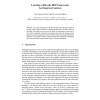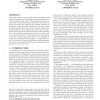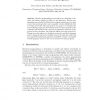252 search results - page 33 / 51 » Two-Dimensional Belief Change |
ISDA
2005
IEEE
14 years 1 months ago
2005
IEEE
Intelligent behavior is the selection of actions based on knowledge. The design of the Fuzzy Adaptive Survivability Tool (FAST) agents and their intelligent behavior is explained....
KES
2005
Springer
14 years 1 months ago
2005
Springer
One of the limitations of the BDI (Belief-Desire-Intention) model is the lack of any explicit mechanisms within the architecture to be able to learn. In particular, BDI agents do n...
JASSS
2002
13 years 7 months ago
2002
This project presents an agent-based simulation model of protest activity. Agents are located in a two dimensional grid and have limited ability to observe the behavior of other a...
NSPW
2004
ACM
14 years 1 months ago
2004
ACM
This paper considers a new security protocol paradigm whereby principals negotiate and on-the-fly generate security protocols according to their needs. When principals wish to in...
LPNMR
1999
Springer
14 years 4 days ago
1999
Springer
Abstract. Revision programming was introduced as a formalism to describe and enforce updates of belief sets and databases. Revision programming was extended by Fitting who assigned...



